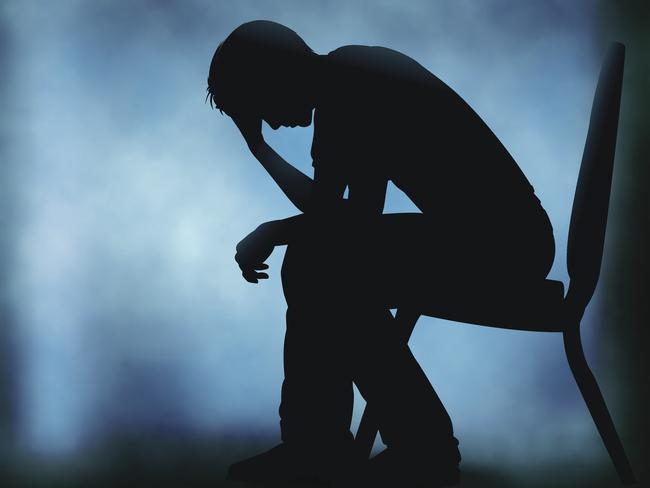Simon Judkins: Nathan’s death highlights our mental health failure
VICTORIA’s mental health system is trailing well behind the rest of Australia and is increasingly reliant on police, ambulances and the justice system to provide frontline care for those with mental health issues, writes Simon Judkins.
Opinion
Don't miss out on the headlines from Opinion. Followed categories will be added to My News.
NATHAN* turned up to the triage desk again. This time, he was pretty agitated.
I’d seen him that night and the night before that. The poor kid had a history which would horrify most people: abused by an uncle, his father had died when he was very young and his mother was drug addicted and on the streets.
Now he has a provisional diagnosis of borderline personality disorder, but no one is really quite sure. He uses marijuana regularly, ice, or to give it its full name, crystal methamphetamine, frequently; he couch surfs or sleeps on the streets.
ALARMING RISE IN CHILDREN WITH MENTAL HEALTH PROBLEMS
FUNDS TO OVERHAUL VICTORIA’S MENTAL HEALTH SYSTEM
HOW TO RAISE MENTALLY RESILIENT CHILDREN
Obviously, when he is seen at the hospital, any plans put in place for his care fall down — he has no real understanding of how to manage his issues … and no home.
That night, I tried to find a place for him to stay but it was only crisis accommodation. So, when he is in trouble, he comes to us. If he keeps coming, he’s admitted to calm things down a bit, but the cycle never seems to be broken.
This day, he is not thinking clearly; he’s obviously drug-affected and angry. I offer him food and drink, some sedatives to bring him down. I request a psych review.
It takes too long for Nathan and he wants to leave. Swearing and abusive, he’s having a bad impact on the staff and other patients. We try to surround him while trying not put ourselves in harm’s way, to talk him down, but he storms past us. I follow him to the ambulance bay but he’s fast. And, once he’s off the hospital grounds, it’s up to the police.
Five minutes later, our security guys come back: “We’ve found him.” I race out and Nathan is on the bridge next to the hospital.
One of the nursing staff stops the traffic and I stand under the bridge. After some tense negotiation, I manage to talk Nathan into getting back over the fence and to meet me on safer ground.
He says: “I’m sick of this. No one gives a f---. No one cares. I just want somewhere to live, somewhere safe.”
We talk for some time. I tell Nathan that he has a choice: to come back to the Emergency Department so we can try again or to go with his cousin, who has just arrived. His cousin seems straight, but he also sleeps in parks, under bridges. He says: “I’ll look after him.”
“What’s the point coming back?” Nathan says. “Nothing changes. It’s all f----d.”

I can hear police sirens approaching. Nathan and his cousin are gone … they heard them before me. The police arrive and ask a few questions. They know Nathan and they know he’ll turn up again soon.
Two days later, he’s back in the ED. This time, he is admitted; he has an acute psychosis and is very unsafe.
I didn’t see Nathan for some time after that. But two months later, his cousin came into the ED. He has been using heavily, was sleeping outdoors and now has pneumonia. He recognises me.
“Remember Nathan?”
“Yeah, how could I forget,” I say lightheartedly.
“He’s dead.”
It hits me like a bullet.
“What?”
“He’d had enough … jumped on the tracks.”
Nathan’s death has hit me. I thought about our last conversation and how hopeless he felt. There were no real solutions and he had no real future. He needed a place to live — a place to stay safe, a place where he could get the treatment he needed.
But “the system” doesn’t cater for people like Nathan. We let him down. I let him down. He was 19.
Emergency Department doctors are signatories to a new report released in Victoria this week by Mental Health Victoria, called Saving lives, saving money: the case for better investment in Victorian mental health .
It is a siren call to Victoria, where chronic underfunding and under-investment by successive governments have left us with a mental health system that is trailing well behind the rest of Australia and is increasingly reliant on police, ambulances, hospitals and the justice system to provide the frontline care for people with mental health issues.
Nathan represents the extreme end of this crisis. But many more are heading down that pathway.
*Nathan is not his real name. If you or someone you know needs support, call Lifeline on 13 11 14.
Dr Simon Judkins is the Melbourne-based president of the Australasian College for Emergency Medicine


